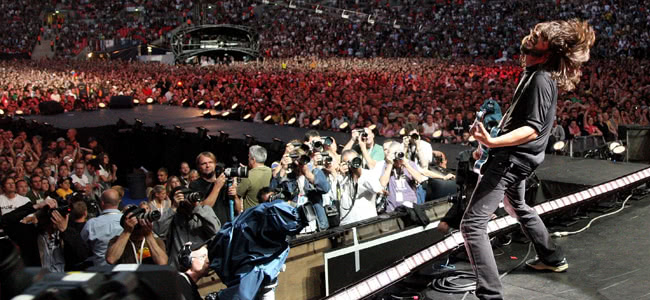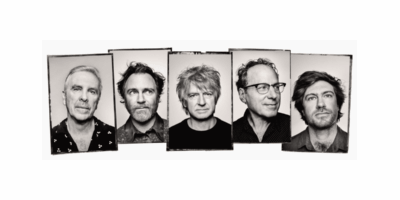One of the most talked-about stories to come out of the music world over the past week has been Dave Grohl’s broken leg. The Foo Fighters frontman fell off the stage during a show in Gothenburg, Sweden and ended up sustaining a pretty serious fracture.
While the resilient singer finished the gig, the band was forced to cancel several European dates, including two sold-out shows at London’s Wembley Stadium and a headlining slot at Glastonbury Festival, which is slated to kick off next week.
Obviously, the news upset many of the band’s UK and European fans, who’d been waiting months to finally see one of the world’s biggest rock groups in the flesh. But those with Wembley tickets will most likely receive refunds and Glastonbury have already announced their replacement.
Sure, those who were flying in for Glastonbury or one of the band’s other dates won’t see that money again, but besides the price of plane tickets and accommodation, and a whole heap of disappointment, the fans get off pretty cheap.
Right in the thick of it, for better or worse, are the guys in suits. As The Telegraph reports, immediately after Grohl broke his leg in Sweden, a call would have been placed to Robertson Taylor. Who is he? They, are the the band’s insurers.
In fact, they’re the brokers behind nine of the 10 highest-grossing music tours ever. It’s the furthest thing from the minds of punters enjoying a blazing rendition of ‘Everlong’ or booking their tickets online, but without insurance, global touring comes to a standstill.
Touring bands is not unlike investing in the stock market. You’re putting money into something you’re only hoping is going to pay off and the variables are near incalculable. There’s money at stake and the bigger the band, the more money stakeholders stand to lose.
“There’s one artist who is currently… almost uninsurable.”Taking out insurance on a gig is not unlike taking out insurance on your car or house. It’s covering your arse just in case something bad happens. As John Silcock, chief executive of Robertson Taylor, explains, almost everything on a tour is insurable.
“Especially for any major global tours… it will be taken out weeks or months in advance of the first show to cover the costs of rehearsals, tickets, equipment and any potential future losses,” Silcock tells The Telegraph.
Silcock’s company brokered the insurance for Michael Jackson’s This Is It Tour, which was scheduled to take place three weeks after the singer’s death. In the case of Foo Fighters, promoters would be covered by “a policy of Cancellation and Non-Appearance insurance”.
“It’s highly specialised because it’s really difficult to legislate and it’s such an important part of touring these days. There are so many reasons why a band or artist might have to cancel: it could be an accident, or even death, but volcanic ash clouds, civil uprest and hurricanes. It can be caused by almost anything.”
In other words, anything where something beyond the artist’s control prevents them from playing. Silcock insists, if the artist simply doesn’t feel like playing then they don’t get a payout. “Most musicians are very professional: if they’re living and working, they want to be on tour,” he says.
[include_post id=”446543″]
“We’ve worked with the most expensive tours in the world. Last year, we insured 14 of the top 20 highest-grossing tours. There isn’t the capacity to insure for the cost of the total gross of the tour,” he explains.
“But clients will get covered so that in the event of a cancellation, they are in the same position that they would be had the show gone ahead. So, if they had sold out Wembley… they would get cover for selling out 90,000 seats.”
Interestingly, not everyone is a breeze to insure. “Some risks are more challenging than others,” Silcock admits. “This might be reflected in the cost of the insurance, or certain terms. In some cases, it might come down to whether or not insurance is available.”
“There’s one artist who is currently, well, not quite uninsurable, but he’s almost uninsurable. There are a very small number of underwriters who are prepared to offer terms and those terms who could be seen to be onerous.”
For those artists who are insurable, it usually works something like this: “As soon as there’s an accident, the artist, promoter, or whoever has taken out the insurance will get in touch,” explains Silcock.
“We want to help them with the procedure as quickly as possible so we can recommend what they do next, whether that’s finding a doctor or another part of the process. It’s not unusual for us to get phone calls at 3am, after a show has finished or before one is taking place in Australia.”
“Sometimes you have to make big decisions. I was called in to a massive open air show in Oslo where there was torrential rain. The forecast said the rain would clear by 9pm, so we thought that if we could get the artist on stage at 9pm, it would be ok.”
“They were there, but then the rain began again – but the artist was on stage, and completed the show from under an umbrella. There was no need for a payout.”


































